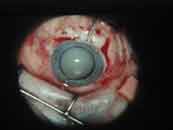Coding
q & a
New Code for Cataracts
Know when to code for complicated cataract surgery.

Question: The surgeon who operates on our cataract patients told us about a new code for "complicated" cataract surgery. What is this new code and when is it used?
Answer: Effective January 1, 2001, a new code for complicated cataract surgery has been added to CPT 2001. The code is 66982. The definition is for extracapsular cataract removal with insertion of intraocular lens prosthesis, manual or mechanical technique, complex, requiring devices or techniques not generally used in routine cataract surgery or performed on patients in the amblyogenic developmental stage.
When to use the code
These types of procedures, which require extraordinary work, are estimated to represent about 2% of all cataract surgeries. An example of when this code is appropriate is pediatric patients who are younger than 8 years old. These patients are more difficult intraoperatively, for they have anterior capsules that tear only with great effort and a cortex that's stubborn to remove.
Other examples include patients who have weakened or absent lens support structures as a result of disease states, infection or trauma.
Subluxated lenses, pseudoexfoliation syndromes, Marfan's syndrome, zonular dehiscence and long-standing glaucoma with small pupils are all conditions that may require that the practitioner use pupil-expanding devices, additional incisions, insertion of capsular support systems or suturing of the implant.
Finally, the advanced, hard, dense and often white cataract that requires prolonged anterior capsulotomy and phacoemulsification times with greater power settings would also qualify for this code.
|
|
|
|
This advanced, "white" cataract would require "complicated" cataract surgery. |
|
Be aware
The national average reimbursement for 66982 is $885.29. This increased payment level is in recognition of the additional preoperative, intraoperative and postoperative follow-up work involved in complex cataract surgery.
If you're providing postoperative care to a Medicare patient who has had complex cataract surgery (assuming that the surgeon and the O.D. have agreed to co-management and that the surgeon's office used the -54 modifier when filing the surgical claim), you must be certain to use the appropriate CPT code and modifier (66982-55) on your Health Care Financing Administration (HCFA) claim form.
If the O.D. and M.D. don't use the exact CPT code when they're filing claim forms for co-managed care, the carrier won't understand the O.D. filing and will deny payment.
Avoid needless resubmission
The majority of your cataract patients will have cataract surgery using the 66984 CPT code, but occasionally the surgeon may have a difficult procedure for which the 66982 CPT code is more descriptive of the service he's provided.
If the M.D. uses the new CPT code and you're providing co-managed postoperative care, the surgeon's office should notify you of the need to also use the new CPT code on your billing so you're both paid without unnecessary resubmission.
Because this code has a higher relative value than 66984, the postoperative care also will reimburse the provider (whether O.D. or M.D.) at a higher level.
Medicare began to reimburse physicians and hospitals for this new procedure on January 1, 2001, but didn't concurrently authorize Medicare payments to ambulatory surgery centers (ASCs). Just recently, however, HCFA announced that it will process claims for ASC facility charges.
Dr. McGreal is center director of the Missouri Eye Associates in St. Louis. He also lectures on clinical and practice management topics.
If you have a coding question you'd like answered, send it to Terri Goshko, c/o Optometric Management, 1300 Virginia Drive, Suite 400, Ft. Washington, PA 19034. E-mail goshkotb@boucher1.com.




